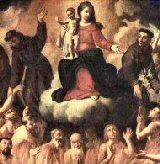[For the audio version of this homily, click here: Christ the King 2003]
Before Attorney General John Ashcroft was confirmed by the Senate back in 2001, he was publicly attacked by certain senators (the usual suspects) for his strong pro-life views. Some of you may remember this; it was “big news” at the time.
They also tried to discredit him for saying that he strives in his life to serve “no king but Jesus.”
Barry Lynn, head of the group that calls itself “Americans United for the Separation of Church and State,” was deeply offended by Ashcroft’s statement.
Members of the Anti-Defamation League were deeply offended.
Ted Kennedy and Patrick Leahy were deeply offended.
Are you offended? Ask yourself that question this morning.
But before you answer, let me read Ashcroft’s words in their proper context. What he actually said was (and here I quote), “A slogan of the American Revolution was the line, ‘We have no king but Jesus’.”
Joseph Farah, in a column he wrote at the time for WorldNetDaily, commented on this remark and said, “[Ashcroft’s statement] is 100 percent accurate. Colonial America rebelled against paying tribute to King George, saying they had ‘no king but Jesus.’”
Obviously some of our current civil leaders wouldn’t have fared too well in Colonial America!
Farah went on to write the following in his column:
“[This statement about the kingship of Jesus] was not only a slogan of the War for Independence, it was [also] the cornerstone of the philosophy that led to the Constitution, with its concepts of a limited federal government and separation of powers.
Not only did this slogan, ‘No king but Jesus,’ in many ways inspire the American vision of freedom and self-government, it is a slogan with a history that goes back to the First Century Church.
Let me remind you of this history.
Why were the first Christians crucified by Rome? Why were they fed to the lions in the Colosseum? Why were the Christians the major target of persecution by the Caesars?
The answer is simple and self-evident: Because they recognized no king but Jesus.
That simple idea was so threatening to the Caesars that Christians paid for it with their lives—by the hundreds of thousands. This was the second holocaust of the modern era—the first being the sacking of Jerusalem in 70 AD. And no one knows for sure just how many Christians were put to death. There are historical descriptions of Roman roadways being lighted by night by the burning corpses of crucified Christians—all because they would serve no king but Jesus.”
Why were the Caesars—and Pontius Pilate—and the senators who attacked John Ashcroft—so threatened by Jesus? Think about the things that Jesus said during his life here on earth: think about his teachings—“Love your enemies; do good to those who hate you; bless those who curse you. . . .Love your neighbor as yourself. . . .Forgive, as you have been forgiven.”
What is so subversive—what is so threatening—about teachings like those?
The answer is, “Nothing—unless you’re not interested in observing them.” Then, they are highly threatening!
Yes, it’s true, King Jesus is a loving, compassionate, merciful ruler. (And for that we should all be deeply grateful, because it means there’s always hope—even for the worst of sinners.) But he’s also a ruler who demands virtue—a ruler who requires holiness of his subjects (or at least he requires that his subjects be striving for holiness).
He doesn’t accept sin and evil, since he came into the world to destroy both.
Pontius Pilate was not interested in following the teachings of Jesus, and so he was threatened by our Lord.
He was not interested, for example, in loving his enemies and knowing the truth. As we heard in today’s Gospel text from John 18, he was only interested in keeping his political power.
The Caesars weren’t interested in forgiveness, they were interested in vengeance—and, as Joseph Farah reminds us, they had some very bloody methods of achieving that goal.
The sad reality is that most of the senators who opposed John Ashcroft’s confirmation as Attorney General were not interested in the teaching of Jesus that says, “Whatever you do to the least of my brothers and sisters, you do to me.” Rather, they were interested in keeping the killing of unborn babies legal in this country. They wanted Ashcroft out of the running, simply because he was pro-life.
Are you offended by the kingship of Jesus? I sincerely hope not, because the kingship of Jesus is really what heaven is all about!
In heaven, Jesus reigns completely, and his gospel of love rules eternally—thank God!
Which leads to the obvious question: If a person is offended by the kingship of Jesus Christ here on earth, wouldn’t he also be offended by heaven itself—since that’s the place where Jesus’ kingship is absolute?
Perhaps this explains (at least in part) why a totally loving God would actually send people to hell: it’s because he doesn’t want to offend them! He knows that putting them in heaven would cause them terrible distress (since they’d have to acknowledge Jesus as king for all eternity), and so he allows them—in the words of Scripture—to “go to their own place”—the place where someone else is master.
Lord Jesus Christ, Son of the living God, we ask you at this Mass to be our king. Take control of every thought, word, and deed. And by the power of your grace, change the hearts of those who are currently offended by your kingship in any way, so that we will all rejoice together someday, in your eternal and glorious kingdom. Amen.


